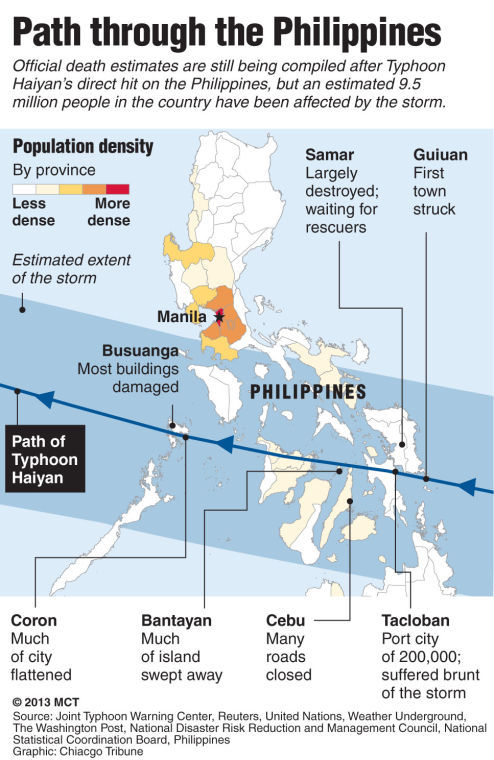Editorial: Poor relief efforts in response to Typhoon Haiyan necessitate student support, commitment to humanitarian aid
November 18, 2013
The aftermath was abysmal. More than a week after Typhoon Haiyan made landfall, Filipinos still haven’t received aid from either the Filipino government or international forces.
According to recent reports, the death toll is climbing: CNN reports 3,976 as the most accurate count. The United Nations approximated last week that the toll exceeded 4,200. According to the Philippines’ National Disaster Risk Reduction and Management Council, there are over 12,000 individuals injured, with just under 2,000 still missing. The truly concerning fact is that none of these numbers are entirely correct: The typhoon’s destruction has prompted widespread uncertainty and confusion among relief efforts and the people of the Philippines. Fortunately, institutions within the United States and other developed nations have already begun efforts to raise relief funding.
According to an NBC World News article, Tim Shenk, spokesman for Doctors Without Borders, said the inaccuracy of those affected stems from “severe logistical difficulties” that have deterred aid from spreading throughout the country for individuals in need of food, water or medical assistance.
More than a week after Haiyan touched down, the Philippine government is still facing criticism for its slow response to the crisis: many communities are still without help and have no access to fresh water, food or medical supplies. The inability for any entity, whether it be the United Nations or the Filipino government, to accurately asses the damage of Typhoon Haiyan, sheds light on both the temporary breakdown of government operations to disperse relief efforts and the lack of commitment of international powers to provide aid to those affected. This breakdown in the international system has necessitated assistance from individual institutions.
For one, the citizens of the Philippines have taken it upon themselves to conduct widespread humanitarian efforts, especially in the portions of the Philippines that were hit the hardest. Survivors in the city of Tacloban have begun to reopen gas stations, while survivors have constructed stalls to sell food and other goods.
Here in the United States, colleges and universities nationwide have initiated their own relief efforts in order to supplement the nearly $20 million the U.S. government has pledged to provide in aid to the Philippines. Princeton, Harvard and the University of San Diego, among others, have held benefit efforts to raise money for individuals affected by Haiyan.
The Pittsburgh City Council is expected to consider a proclamation to declare today “Filipino American Association of Pittsburgh Day” and encourage locals to help out, according to an article in the Pittsburgh Post-Gazette.
“We know some people from the Filipino community who have their families back in the Philippines, and they have been struck with destruction,” said Paula Pascual, president of Pitt’s Filipino Students Association, in an email.
Pascual and the FSA have begun to organize fundraising campaigns to make donations to the American Red Cross, AmeriCares and Operation USA that will be used to aid the survivors of Haiyan.
Pascual noted that these campaigns and planned fundraisers will coincide with a fundraising dinner this Friday, Nov. 22, at North Way Church in Oakland. Both FSA and the Asian InterVarsity organization are hosting this dinner to raise funds that will go directly to the relief effort abroad.
Pascual also stressed that the joint efforts of the Filipino community, including the Filipino American Association of Pittsburgh and the FSA, has been instrumental in this humanitarian effort.
“It’s been really amazing, and we are so thankful for everyone’s help and caring thoughts,” Pascual said.
Students and communities nationwide should continue to contribute to rehabilitating the individuals and families in the Philippines. It is crucial that we, as members of a university with students hailing from a number of countries (including the Philippines), should contribute to the national and global humanitarian effort. It’s our obligation and responsibility.
“We will rise above this with the strength and aid by all the amazing people who [have] helped us already,” Pascual said.



